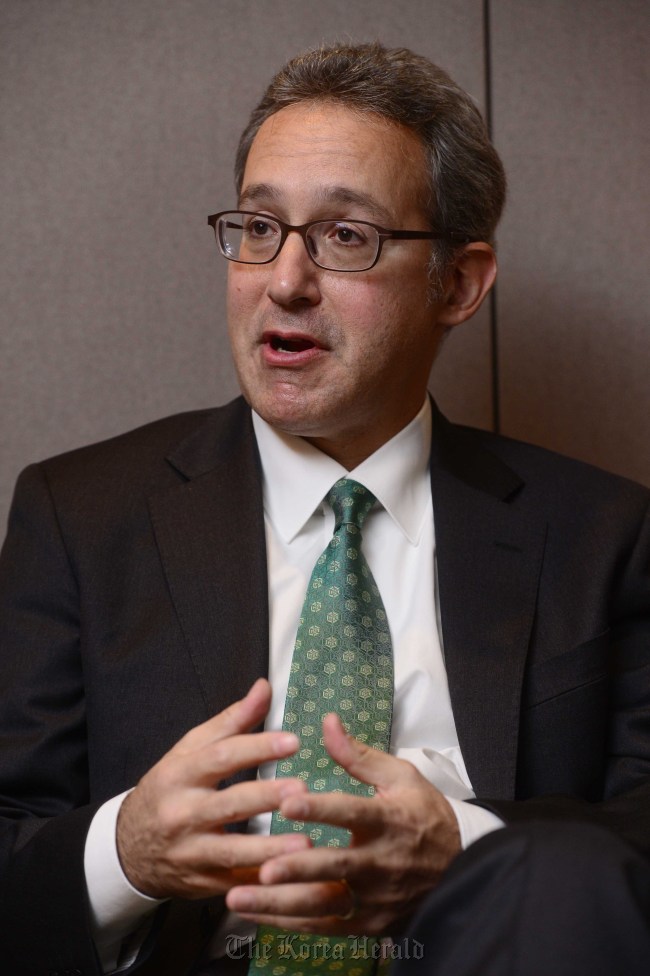In less than a week, Korea has emerged as the center of global efforts to help developing countries implement a low-carbon growth strategy.
The country was picked Saturday to host the secretariat of the Green Climate Fund, which will be the largest financial source for eco-friendly development for poor countries.
On Thursday, Seoul successfully transformed its Global Green Growth Institute into an international organization to lead research and policy planning for the same cause.
Richard Samans, executive director of the GGGI, expressed confidence that the two bodies’ collaboration will create synergy to efficiently achieve the goal of reducing carbon emissions without compromising developing and emerging countries’ demand for growth.
“The success of the fund rests on operational capacity, which will need not only a strong policy plan but also investment case, and that’s the area in which the GGGI is very specialized. I’m expecting whole synergy between the two institutions,” Samans said in an interview on Tuesday on the sidelines of its inaugural meeting as an international body.
The country was picked Saturday to host the secretariat of the Green Climate Fund, which will be the largest financial source for eco-friendly development for poor countries.
On Thursday, Seoul successfully transformed its Global Green Growth Institute into an international organization to lead research and policy planning for the same cause.
Richard Samans, executive director of the GGGI, expressed confidence that the two bodies’ collaboration will create synergy to efficiently achieve the goal of reducing carbon emissions without compromising developing and emerging countries’ demand for growth.
“The success of the fund rests on operational capacity, which will need not only a strong policy plan but also investment case, and that’s the area in which the GGGI is very specialized. I’m expecting whole synergy between the two institutions,” Samans said in an interview on Tuesday on the sidelines of its inaugural meeting as an international body.

Some 300 officials from 18 member countries gathered here for the two-day event.
Founded by the Korean government in 2010, the Seoul-based institute envisages a “think and act tank” that brings together donor and recipient countries to share experiences and technology know-how for eco-friendly development.
Members include the U.K, Australia, Denmark, Mexico, the United Arab Emirates, Indonesia, Ethiopia, the Philippines and Costa Rica.
The GCF, which plans to funnel about $100 billion annually by 2020, will be located in Songdo in the western coastal city of Incheon.
The two institutions are expected to have pivotal roles in spreading green growth and keeping its momentum alive amid a protracted economic slowdown and lingering skepticism of feasibility of renewable energy sources.
Some raised financing concerns for the institute which resorts largely to voluntary donation.
Korea, Denmark, Australia and the UAE vowed to inject $5 million a year for “core funding,” while other donors such as Britain and Norway are contributing unspecified sums on a program basis, according to its officials.
He dismissed such a concern saying, “Financing is not an obstacle.”
“My bigger challenge is creating a new model of economic growth and having an institutional ability to help developing countries find a path to green growth and use resources efficiently,” he added.
The GGGI faces other daunting challenges. All member countries but three have yet to ratify related legislation, with some showing no likelihood over the short haul.
As for Seoul, the motion is pending in the National Assembly’s standing committee after some lawmakers raised issue with the organization’s allegedly improper spending of some of its budget. Samans hopes the problem will be resolved “as soon as possible.”
The fledgling organization will focus on convincing recipient members that “green growth is possible and will provide action-oriented impact,” he
“In the medium and long term, I’m extremely positive about renewable energy. I’m a big believer of technological progress, which will make it highly competitive technology, increasing co-benefits of meeting development needs and environmental protection on the other side,” he added.
Samans, a leading expert on environment and economy, joined the GGGI last year after spending 10 years as managing director of the World Economic Forum. He assisted former U.S. President Bill Clinton as a senior advisor on international economy from 1999-2002.
He is also a non-resident senior fellow for international economic policy at the Washington-based Center for American Progress and chairman of the Climate Disclosure Standards Board, which was launched at a 2007 Davos meeting.
By Shin Hyon-hee (heeshin@heraldcorp.com)




![[Music in drama] Rekindle a love that slipped through your fingers](http://res.heraldm.com/phpwas/restmb_idxmake.php?idx=644&simg=/content/image/2024/05/01/20240501050484_0.jpg&u=20240501151646)

![[New faces of Assembly] Architect behind ‘audacious initiative’ believes in denuclearized North Korea](http://res.heraldm.com/phpwas/restmb_idxmake.php?idx=644&simg=/content/image/2024/05/01/20240501050627_0.jpg&u=20240502093000)




![[KH Explains] Will alternative trading platform shake up Korean stock market?](http://res.heraldm.com/phpwas/restmb_idxmake.php?idx=644&simg=/content/image/2024/05/01/20240501050557_0.jpg&u=20240501161906)






![[Today’s K-pop] Stray Kids go gold in US with ‘Maniac’](http://res.heraldm.com/phpwas/restmb_idxmake.php?idx=642&simg=/content/image/2024/05/02/20240502050771_0.jpg&u=)